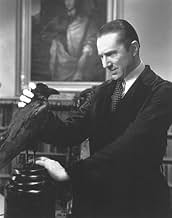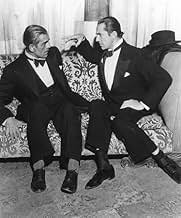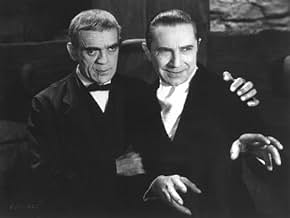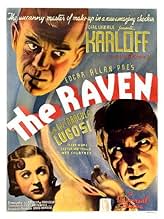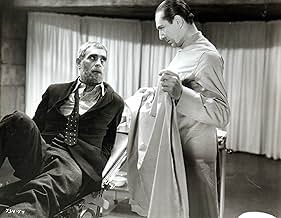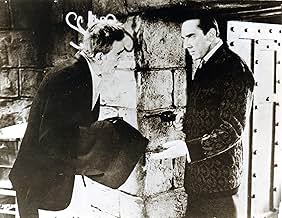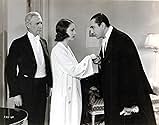NOTE IMDb
6,8/10
7 k
MA NOTE
Ajouter une intrigue dans votre langueA brilliant surgeon with a morbid obsession for instruments of torture grows dangerously obsessed with a young socialite whose life he's saved.A brilliant surgeon with a morbid obsession for instruments of torture grows dangerously obsessed with a young socialite whose life he's saved.A brilliant surgeon with a morbid obsession for instruments of torture grows dangerously obsessed with a young socialite whose life he's saved.
- Réalisation
- Scénario
- Casting principal
Boris Karloff
- Edmond Bateman
- (as Karloff)
Bela Lugosi
- Dr. Richard Vollin
- (as Lugosi, Bela Lugosi)
Anne Darling
- Autograph Hound
- (scènes coupées)
June Gittelson
- Autograph Hound
- (scènes coupées)
Joe Haworth
- Drug Clerk
- (scènes coupées)
Mary Wallace
- Autograph Hound
- (scènes coupées)
Raine Bennett
- Actor reading 'The Raven'
- (non crédité)
Al Ferguson
- The Crook
- (non crédité)
Nina Golden
- Dancer
- (non crédité)
Jonathan Hale
- Bedside Dr. at Jerry's Right
- (non crédité)
Arthur Hoyt
- Chapman - Buyer of Poe Memorabilia
- (non crédité)
Avis à la une
This solid little horror feature offers Bela Lugosi and Boris Karloff together again, plus an interesting (if completely implausible) story. There are a fair number of Edgar Allan Poe references, but no real connections - none of the material bears any real resemblance to Poe, and the references are meant to be atmospheric at the most.
Lugosi's role in this one is much larger than Karloff's, and Bela carries most of the story. His theatrical style is quite appropriate in the role of Dr. Vollin, making for an entertaining yet genuinely dangerous foe. When Lugosi is in good form, he can make the most ridiculous dialogue come out right. Both the story and dialogue here would indeed collapse under the most basic logical analysis, and Lugosi's showmanship is one of the reasons why much of it works anyway.
While Karloff has a smaller role, he also does a good job, and indeed the movie would not have worked very well without Karloff's efforts in making Bateman pathetic and unheroic, yet human and understandable. The rest of the cast have fewer opportunities, yet the roles are filled by good character players who all do their jobs well.
The consensus, namely that "The Raven" is a cut below the previous year's Boris/Bela collaboration "The Black Cat", seems accurate. Yet "The Raven" in itself is a solid and usually entertaining feature.
Lugosi's role in this one is much larger than Karloff's, and Bela carries most of the story. His theatrical style is quite appropriate in the role of Dr. Vollin, making for an entertaining yet genuinely dangerous foe. When Lugosi is in good form, he can make the most ridiculous dialogue come out right. Both the story and dialogue here would indeed collapse under the most basic logical analysis, and Lugosi's showmanship is one of the reasons why much of it works anyway.
While Karloff has a smaller role, he also does a good job, and indeed the movie would not have worked very well without Karloff's efforts in making Bateman pathetic and unheroic, yet human and understandable. The rest of the cast have fewer opportunities, yet the roles are filled by good character players who all do their jobs well.
The consensus, namely that "The Raven" is a cut below the previous year's Boris/Bela collaboration "The Black Cat", seems accurate. Yet "The Raven" in itself is a solid and usually entertaining feature.
This is the Boris & Bela show all the way. Like its sort-of companion piece "The Black Cat," THE RAVEN involves young lovers held captive by a madman with an odd hobby, in a large house which is elaborately tricked-out with amenities not usually found in even the most exclusive residences. This time out, Boris is the nominal "hero" (as with "The Black Cat," the male half of the young couple proves remarkably useless) and Bela the nut-case: Richard Vollin; doctor, Poe aficionado and do-it-yourself-er without peer. Summoned from retirement to perform life-saving surgery on Jean Thatcher, a lovely young dancer, he subsequently falls head-over-heels for her, and the trouble starts.
Lugosi was a better actor than he usually gets credit for being; his downfall seemed to stem from a lack of selectivity about what projects he accepted, frequently landing him in dreck. THE RAVEN gives him ample opportunities to shine, and he makes the most of them. Some consider his work here over-the-top, but scenery-chewing is entirely appropriate to the character, who is written as an arrogant egomaniac - he refers to himself as "a law unto myself" and even "a god" - and probably the only out-and-out lunatic Lugosi ever played. The desires or welfare of others simply don't enter into the equation for Vollin. After repeated refusals to perform Jean's operation, only an appeal to his ego ("So, they DO say I am the only one!") can induce him; that the object of his affection makes no secret of her love for someone else is of no consequence to him, and for the one "nice" deed he does for someone else - making Jean's fiancé his research assistant - he flatters himself that he's being magnanimous, though his true motivation, keeping the young rival too busy to interfere with his pursuit of Jean, is nonetheless self-serving.
The gloriously unrestrained nature of his performance notwithstanding, he gives us some of his best moments here: when he finds himself in Karloff's clutches, totally helpless and at Boris' mercy, the panic beneath his thin veneer of casual bravado is palpable. Likewise the barely-controlled fury and pain when, ostensibly speaking about Poe, he tells of the madness that grips "a man of genius denied of his great love," and how that madness can drive him to conceive of "torture....torture for those who have tortured him." His perverse glee in inflicting that torture is chilling, and he even displays some unexpectedly dry wit. When Vollin demands of Jean's father, Judge Thatcher, "There are no two ways; send her to me," the Judge gasps an incredulous "Do you know what you're saying?" Lugosi, in a deliberate monotone, answers the question literally; repeating, "There - are - no - two - ways - send - her - to - me!"
If I've put the emphasis here on Lugosi, it's because he truly dominates all around him, including Karloff. That's no reflection on Boris; he just plays a mostly passive character: Edmond Bateman, bank robber and escaped con, who seeks Vollin out for an operation to make him "look different." Given the shady-looking hood who passes Vollin's name and address to Bateman, and the seedy surroundings in which the meeting takes place, one can't help but wonder at Vollin's social contacts, and the kind of services he's previously solicited (or performed). The unfortunate Bateman soon finds himself in over his head, the victim of Vollin's particularly sadistic blackmail.
As with Frankenstein's creation, Boris suffuses Bateman with pathos. "I don't want to do them things no more," he pleads, when Lugosi sets out to enlist his help for some dastardly deeds. Because of his predicament, we can feel sympathy for Bateman, even as he does more of "them things" at Vollin's behest. Under heavy and restricting makeup, as was often the case, Boris is able to communicate a great deal with his eyes (or, in this case, eye). Watch the excitement in them (it?) as Lugosi removes the post-op bandages; your heart fairly breaks because you know the shock that's in store for him.
The supporting cast is filled out with familiar and capable players such as Inez Courtney and Ian Wolfe (who has one of the film's best lines when, as Bela goes on his torture rampage, protests with an oh-so-civilized, "See here, Vollin, things like this can't be done!").
The ever-dependable and versatile Samuel S. Hinds provides us with one of his delightfully stodgy curmudgeons as Judge Thatcher, and he deserves a special nod on general principle. Hinds was one of those "oh, I've seen him a hundred times before" actors (whose face is probably known by far more people than his name) who, during the '30's and '40's, seemed to pop up in every third film released. His persona varied little (and he seemed doomed to rarely being cast as anything besides judge, doctor or lawyer), but he was able to bend it in whatever direction a role required, enabling him to move with ease from the tight-ass Thatcher to Slade, the corrupt, tobacco-spittin' judge in "Destry Rides Again," to the sage and kindly family physician in "The Boy With Green Hair." Too bad he never did a "Huck Finn;" he'd have been great as The King.
Despite the improbability (oh, all right; absurdity) of the plot, the script provides some wonderful dialogue. Hinds has the great good fortune of uttering the catchy phrase, "stark-staring mad" on more than one occasion. But the delivery of even the pithiest exchanges, such as "'You monster, you like to torture.' 'Yes, I like to torture.'" gives them a vitality far beyond what is on the page. When all is said and done, though, THE RAVEN is, above all, B & B's show. Each is at the top of his game, and together, they own it.
Lugosi was a better actor than he usually gets credit for being; his downfall seemed to stem from a lack of selectivity about what projects he accepted, frequently landing him in dreck. THE RAVEN gives him ample opportunities to shine, and he makes the most of them. Some consider his work here over-the-top, but scenery-chewing is entirely appropriate to the character, who is written as an arrogant egomaniac - he refers to himself as "a law unto myself" and even "a god" - and probably the only out-and-out lunatic Lugosi ever played. The desires or welfare of others simply don't enter into the equation for Vollin. After repeated refusals to perform Jean's operation, only an appeal to his ego ("So, they DO say I am the only one!") can induce him; that the object of his affection makes no secret of her love for someone else is of no consequence to him, and for the one "nice" deed he does for someone else - making Jean's fiancé his research assistant - he flatters himself that he's being magnanimous, though his true motivation, keeping the young rival too busy to interfere with his pursuit of Jean, is nonetheless self-serving.
The gloriously unrestrained nature of his performance notwithstanding, he gives us some of his best moments here: when he finds himself in Karloff's clutches, totally helpless and at Boris' mercy, the panic beneath his thin veneer of casual bravado is palpable. Likewise the barely-controlled fury and pain when, ostensibly speaking about Poe, he tells of the madness that grips "a man of genius denied of his great love," and how that madness can drive him to conceive of "torture....torture for those who have tortured him." His perverse glee in inflicting that torture is chilling, and he even displays some unexpectedly dry wit. When Vollin demands of Jean's father, Judge Thatcher, "There are no two ways; send her to me," the Judge gasps an incredulous "Do you know what you're saying?" Lugosi, in a deliberate monotone, answers the question literally; repeating, "There - are - no - two - ways - send - her - to - me!"
If I've put the emphasis here on Lugosi, it's because he truly dominates all around him, including Karloff. That's no reflection on Boris; he just plays a mostly passive character: Edmond Bateman, bank robber and escaped con, who seeks Vollin out for an operation to make him "look different." Given the shady-looking hood who passes Vollin's name and address to Bateman, and the seedy surroundings in which the meeting takes place, one can't help but wonder at Vollin's social contacts, and the kind of services he's previously solicited (or performed). The unfortunate Bateman soon finds himself in over his head, the victim of Vollin's particularly sadistic blackmail.
As with Frankenstein's creation, Boris suffuses Bateman with pathos. "I don't want to do them things no more," he pleads, when Lugosi sets out to enlist his help for some dastardly deeds. Because of his predicament, we can feel sympathy for Bateman, even as he does more of "them things" at Vollin's behest. Under heavy and restricting makeup, as was often the case, Boris is able to communicate a great deal with his eyes (or, in this case, eye). Watch the excitement in them (it?) as Lugosi removes the post-op bandages; your heart fairly breaks because you know the shock that's in store for him.
The supporting cast is filled out with familiar and capable players such as Inez Courtney and Ian Wolfe (who has one of the film's best lines when, as Bela goes on his torture rampage, protests with an oh-so-civilized, "See here, Vollin, things like this can't be done!").
The ever-dependable and versatile Samuel S. Hinds provides us with one of his delightfully stodgy curmudgeons as Judge Thatcher, and he deserves a special nod on general principle. Hinds was one of those "oh, I've seen him a hundred times before" actors (whose face is probably known by far more people than his name) who, during the '30's and '40's, seemed to pop up in every third film released. His persona varied little (and he seemed doomed to rarely being cast as anything besides judge, doctor or lawyer), but he was able to bend it in whatever direction a role required, enabling him to move with ease from the tight-ass Thatcher to Slade, the corrupt, tobacco-spittin' judge in "Destry Rides Again," to the sage and kindly family physician in "The Boy With Green Hair." Too bad he never did a "Huck Finn;" he'd have been great as The King.
Despite the improbability (oh, all right; absurdity) of the plot, the script provides some wonderful dialogue. Hinds has the great good fortune of uttering the catchy phrase, "stark-staring mad" on more than one occasion. But the delivery of even the pithiest exchanges, such as "'You monster, you like to torture.' 'Yes, I like to torture.'" gives them a vitality far beyond what is on the page. When all is said and done, though, THE RAVEN is, above all, B & B's show. Each is at the top of his game, and together, they own it.
Followers of horror melodrama will get a full evening's entertainment out of THE RAVEN... it has some hair-raising situations.. All that has been left of the famous...Poe poem is the title. A statuette of a raven, which Lugosi kept on his desk was the excuse for the use of the title. A situation that will give shudders is when Lugosi removes bandages from Karloff's face, which he had disfigured horribly. Director Friedlander has kept the pace at a nice pitch, stripping it down to its fundamentals and letting the shock troupers, Karloff and Lugosi do their worst. Universal's high batting average for year 1935 with the shockers, only this one looks the least costly of 'em, without any obvious cheating. However, this film is a classic and worth viewing if you are lovers of Lugosi and Karloff...
'The Raven' seems like it was trying to recreate the success (artistically) of Edward G. Ulmer's 'The Black Cat' released the previous year. Once again horror legends Karloff and Lugosi are teamed up in a movie supposedly inspired by Edgar Allen Poe. Of course it has nothing much to do with Poe apart from Lugosi reciting Poe's poem once or twice and having his own private version of 'The Pit And The Pendulum' in his basement. 'The Raven' isn't as inspired and as downright strange as 'The Black Cat' but it's still very good. Karloff receives top billing but this is Lugosi's movie all the way. He plays a brilliant surgeon and Poe buff who is talked into saving the life of a beautiful young girl (Irene Ware). He then becomes obsessed by her and when he can't get what he wants decides to punish her, her fiance (Lester Matthews) and her father (Samuel S. Hinds). Along the way he has turned criminal Karloff into a disfigured monster and forces him to help. Lugosi is really terrific as the mad surgeon and his performance will delight his fans. Recommended.
Karloff gets the top billing in this second feature pairing both horror stars, but it is Bela Lugosi all the way who steals each and every scene he is in. Lugosi is incredible in his over-the-top performance of a morbid, obsessed doctor and Poe aficionado. Each line he utters with flair and gusto, each movement an outrageous, maniacal gesture. He is truly a ham, and an enjoyable one at that. Karloff is quite good as a killer, and the only compassionate character in the story. He is disfigured by Lugosi, so he will kill for the mad doctor. One of the best scenes is Lugosi leaving his patient to see his handiwork. Karloff shoots through several mirrors after realizing the atrocities committed on him, and from a door in the roof of the room.....Lugosi peers through and laughs...laughs with coldness, cruelty, and hysteria. The rest of the film is devoted to Lugosi utilizing his Poe recreations of torture...and I must confess as an earlier reviewer noted that you really feel little sympathy for the other characters involved...and at one point I wanted the pendulum to win. You must see this film as it is the second best of the Karloff/Lugosi pairings...but it really is a Lugosi film.
Le saviez-vous
- AnecdotesAccording to Greg Mank's book "Karloff and Lugosi, Karloff received $10,000 for his work, Lugosi $5000, Irene Ware $625, Lester Matthews $1153.76, and Samuel S. Hinds $1333.35.
- GaffesAfter Dr. Vollin regales his house guests on the subject of Edgar Allan Poe, all rise to retire. Jean Thatcher stops, returns to her former place on the couch, and has to free her gown from the cushion. This action causes her to be the last guest to leave the room, allowing her to have a private moment with Bateman. In their subsequent two-shot, she apologizes to him for having been startled earlier when he'd entered the room where she was fixing her hair.
- Citations
Edmond Bateman: I'm saying, Doc, maybe because I look ugly... maybe if a man looks ugly, he does ugly things.
Dr. Richard Vollin: You are saying something profound.
- Crédits fousThe names of Spencer Charters and Ian Wolfe were accidentally reversed in the credits.
- ConnexionsFeatured in House of Horror: The Raven 1935 (1958)
- Bandes originalesMusic
(uncredited)
from Le Chat noir (1934)
Original Music and Classical Music Arrangements by Heinz Roemheld
Played as background music
Meilleurs choix
Connectez-vous pour évaluer et suivre la liste de favoris afin de recevoir des recommandations personnalisées
Détails
Box-office
- Budget
- 115 000 $US (estimé)
- Durée1 heure 1 minute
- Couleur
- Rapport de forme
- 1.37 : 1
Contribuer à cette page
Suggérer une modification ou ajouter du contenu manquant

Lacune principale
By what name was Le Corbeau (1935) officially released in India in English?
Répondre

